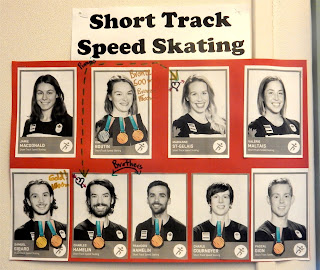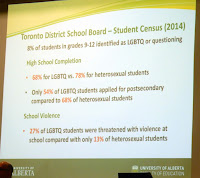The
day was February 5th and the very special moment had finally
arrived. I briefly stopped teaching my
second period class and quickly drew open the red curtains. Several students from other classes came into
mine as I was pulling out my digital camera from my backpack. We all watched through the windows and waited
in silence. My camera was at the ready.
If
the surrounding mountains were not in the way, this important event would be
happening in late January. After waiting
a minute or two, the sun appeared from behind a mountain. Not all of it; just the “top” part, if you
can call it that. That’s all everyone
needed. “The sun’s back!” someone
said. I clicked several pictures. Dark season was done for another year.
As
I’ve written on many previous accounts, the sun disappears from view in
mid-November and doesn’t come back until early February. Arctic Bay still receives some sunlight in
the middle of the day but we don’t see the actual sun. The departure of the sun is a somber moment
but its return is a celebration. The sun
only stayed up for about 20 minutes before sinking behind a mountain. From now on, the sun will stay above the
mountains for an additional 20 minutes with every passing day. By the time May arrives, the entire area will
be enveloped by 24-hour daylight.


Inuujaq
School held its annual Return of the Sun Assembly on February 6th. Everyone gathered in the gym for the
celebration. Posters depicting the
return of the sun were pasted along the gym walls. Quite a few teachers & students were
wearing bright colours. The assembly
began with the lights being turned off and an elder lighting a qulliq (oil
lamp). She briefly explained the history
of the qulliq and how the lamp kept Inuit warm during the harsh dark
season.
The
lights were turned on and the high school Inuit culture teacher continued the
festivities by playing guitar and singing two songs in Inuktitut. This was followed by the Grades 9 & 8
teachers playing African drums. The
assembly concluded with the Grade 3 teacher playing “You Are My Sunshine” on the
accordion.

My
workload as the school’s Professional Development (PD) Coordinator increased
with the arrival of February.
Professional Development (PD) Week was scheduled for February 12 – 16,
and this year, a conference was taking place in Iqaluit. The Qanirraqtit Conference would only be
attended by teachers in the Northern Qikiqtani Region because there are not
enough hotel rooms to accommodate everyone in the entire Qikiqtani Region.
Iqaluit recently lost 87 hotel rooms because the Hotel Arctic was bought
by the Arctic College and turned into a student residence. The Southern Qikiqtani Region will have their PD conference in 2019. (The last time the Nunavut Teachers
Association (NTA) held a territorial wide conference was in 2012).

Planning
for the conference had begun as early as last year. Teachers who were interested in presenting at
the conference had to make their intentions known by the end of October (2017). For me, I had to regularly check my email and
download any documents that needed to be passed on to the staff. I also relayed any questions the staff had
about the upcoming conference. I spent
late January helping teachers with online registration. Flight information, hotel accommodations,
conference programs, bus schedules, and blizzard plans were distributed in
early February. Everyone received an
envelope containing these documents. I
stored copies of all conference related documents in a large binder, thus
making my life easier.

Everyone,
minus one, flew down to Iqaluit on February 12 on two separate flights. I & five other teachers were on the late
flight. We flew up to Resolute, then
down to Iqaluit, arriving at 10:30pm.
Originally, I thought the conference committee was going to charter an
aircraft, but they instead chose on two First Air flights. I didn’t know why until I got to Inuksuk High
School the following day. First Air was
one of the major sponsors of the conference.
Everyone from Inuujaq School, except me, stayed in a hotel. I stayed with my older brother.
 |
| Translator booths. |
The
“main base of operations” for the conference was Inuksuk High School. Memories of my time teaching there in 2012
& 2013 flooded my mind as I walked through the main doors. The registration area was in the cafeteria. I found the table labelled “Arctic Bay” and
was given a name tag & a welcome bag, happily supplied by First Air. Everyone was shuffled into the gym for the
opening ceremony. The gym had been
converted into a makeshift auditorium.
Chairs arranged in a large semicircle occupied the middle of the
gym. At the back were tables containing
listening devices and booths for the Inuktitut, English, and French
translators. The ceremony began at 9am.
 |
| Listening devices. |
 |
| NTA President: John Fanjoy. |
 |
Deputy Minister of Education:
Pujjuut Kusugak. |
The
two emcees welcomed everyone to Iqaluit and the conference. They called up NTA President John Fanjoy to
deliver his welcome address. At the end
of his address, Fanjoy invited the Deputy Minister of Education, Pujjuut
Kusugak, to say a few words. In
Inuktitut, he spoke about the importance of education and having qualified
teachers to teach & inspire Nunavut’s youth. The next presenter was David Serkoak who
spoke about his life & his work as a teacher. He ended his presentation by playing the
Inuit drum. Craig MacGregor, the person
in charge of the entire conference, took the podium to welcome everyone to the
conference and to thank his staff for helping him put everything together. The week-long conference was officially
declared “opened” by Hannah Stoney & Peepeelee Pijamini, two Inuit teachers
who ceremonially lighted a qulliq at the front of the gym. Everyone was dismissed for a 15-minute break.
 |
| David Serkoak. |
The
Frobisher Inn was the caterer, providing all the food & beverages for the
snack breaks and the banquet. (More on
that later). We were responsible for
lunch & dinner.
 |
| Hannah Stoney & Peepeelee Pijamini. |
 |
| Christine Jenkins |
Everyone
returned to the gym for the first Keynote Address. There would be a Keynote Address at the beginning
of each day of the conference. Christine
Jenkins was the first presenter, speaking about effective literacy instruction
and reading strategies. Her informative
presentation lasted 90 minutes. Everyone
was then dismissed for lunch. I
immediately headed over to Yummy Shawarma.
I had gone without shawarma for about 2 months and I needed my fix.
Prior
to attending the conference, teachers were required to sign up for 8 periods of
workshops, spread across three days. Some
workshops took up two or more periods. There
were plenty of choices to make. I could
spend several blog posts listing all the choices, so I’ll just focus on the
workshops I attended.
The
first workshop I attended was Youth Self-Injury, organized by the Embrace Life Council. The presented was one of my
former co-workers, Kim Masson. The
workshop focused on recognizing certain patterns of behaviour that youth
exhibit when they self-injure, and what to do if the behaviour becomes severe.
 |
| Craft Sale. |
A
craft sale was held at the high school on the evening of February 13th. Unfortunately, it wasn’t as large as the one
in 2015. There were some interesting
items but not many selections.
The
following day, I attended three workshops on reading, archaeology education,
and Attention Deficit Hyper Activity Disorder.
All three workshops were very informative and provided good lists of
resources for teachers to use.
 |
| Dr. Kris Wells. |
Dr. Kris Wells from the University of Alberta gave a very good keynote address on
Thursday, February 15th. His
topics included: homophobia, transphobia, bullying, harassment, life for LGTBQ
youths in schools, and school safety. He
was also promoting the website: nohomphobes.com. I was glad to see a presentation like this happening
in Nunavut because these topics are still taboo outside Iqaluit and need to be addressed. The homophobic & transphobic behaviours of
the north & the world need to be eradicated. We’re human after all. Dr. Wells concluded his presentation by
sharing 4 ways teachers can make their schools more inclusive.
The
last three workshops I had were about incorporating land skills in social
studies, psychological first aid, and an introduction to autism spectrum
disorders.
The evening
banquet was held at the Frobisher Inn.
The NTA booked both conference rooms and had them turned into large
dining halls. Everyone dressed up for
the occasion. I also wore a sealskin tie
& vest. The catered food was excellent. The main courses were prime rib & Asian flavoured
chicken. There were plenty of side
orders & desserts to choose from.
 |
| Qaapik Attagutsiak & Natsiq Kango. |
The
banquet continued with musical performances from two high school students. Alassua Hanson & Mary Itorcheak sang songs
they personally wrote and throat sang to the delight of the audience. To officially close the conference, a
ceremonial qulliq lamp was lighted by Qaapik Attagutsiak from Arctic Bay She is
Arctic Bay’s eldest elder. (I didn’t
know about this arrangement). She briefly
talked about her life and how she was taught to use a qulliq. Natsiq Kango translated in English.
 |
| Me posing with coworkers and two teachers I met in Iqaluit. |
The
festivities continued with speeches from Craig MacGregor & John Fanjoy, and
a local band performing for two hours.
 |
| Nellie Kusugak. |
There
was one more Keynote Address on the morning of Friday, February 16th. The speaker was the Commissioner of Nunavut,
Nellie Kusugak. Kusugak has been involved in education since 1986 and was a teacher for many years. She spoke about the
importance of education, the role of teachers, and which teachers inspired her to have a career in education.
The
Inuujaq School teachers flew back to Arctic Bay in the afternoon. I made sure to have one more shawarma before leaving
Iqaluit. We brought back gifts, school
supplies, and many memories. The only
thing left for me to do as PD Coordinator was help the teachers with their
substantiation documents.
 |
Arctic College constructed a new
addition to their main campus. |
Overall,
PD Week was a success. We all learned a
lot and networked with teachers in the North Qikiqtani Region. I also successfully handed out all the custom
made NTA fidget spinners I ordered from China.
I hope they’ll catch on and the association will ask me to order more. I want to keep this craze going for a little
longer.
 |
| NTA fidget spinner. |








































